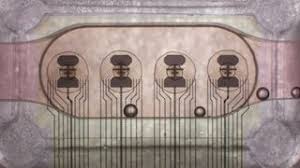This new bioprocessing platform, called the Neuroplatform, uses small versions of human brains to do computer work instead of silicon chips. The company says it can fit 16 of these mini-brains onto the Neuroplatform and use a fraction of the energy required to power a traditional set up.
The platform, currently adopted by nine institutions, integrates hardware, software and biology to construct a processing system that is energy-efficient and high-performing.
FinalSpark’s founders, Fred Jordan and Martin Kutter, hope to harness the human brain’s compatibility with silicon chips to make a greener future in the tech industry.
“Potentially, computing may ultimately become an activity with no ecological footprint,” Jordan said.
The Neuroplatform
The Neuroplatform is made up of 16 spherical brain organoids, or miniature human brains grown in a lab.
The organoids that the Neuroplatform gives access to are made up of about 10,000 living neurons from stem cells derived from human skin tissue, according to Jordan.
These tiny spheres, about 0.5 mm (0.02 in) wide, are kept in sterile incubators at body temperature, provided with water and nutrients and connected to an electrical circuit with small electrodes, according to the founders’ research paper in Frontiers.
Using these specialized electrodes, scientists can send electrical signals into brain organoids and measure the resulting responses.
“[The Neuroplatform] enables researchers to test ideas without having to setup a biological lab and hire all the dedicated personnel,” Jordan said.





